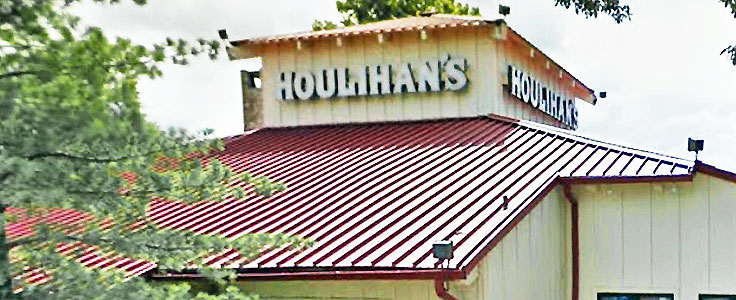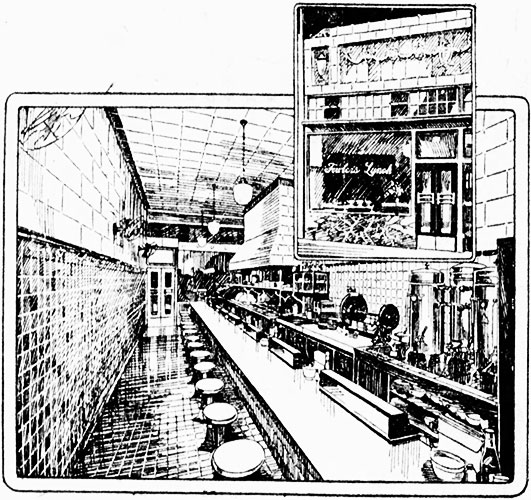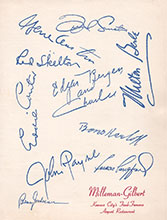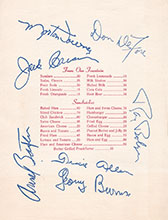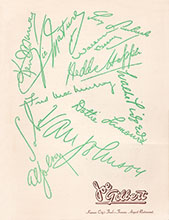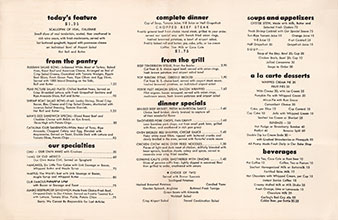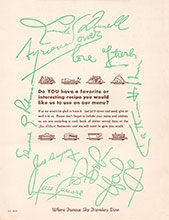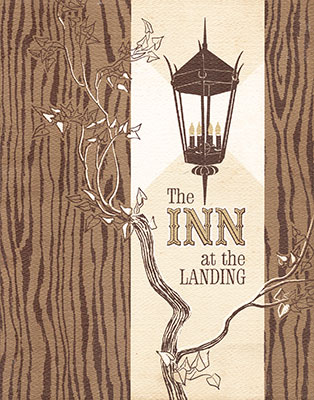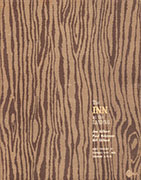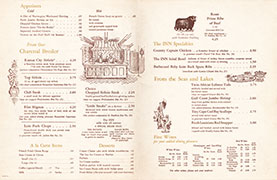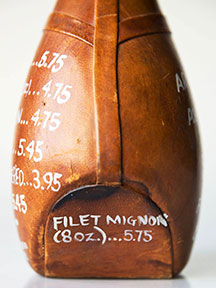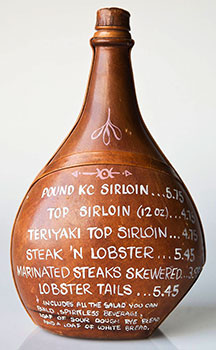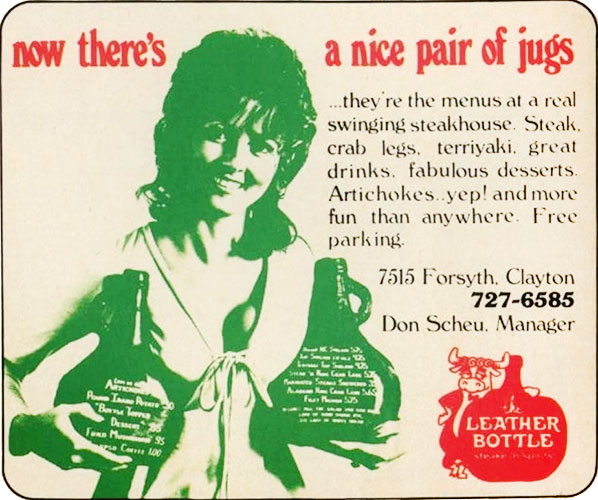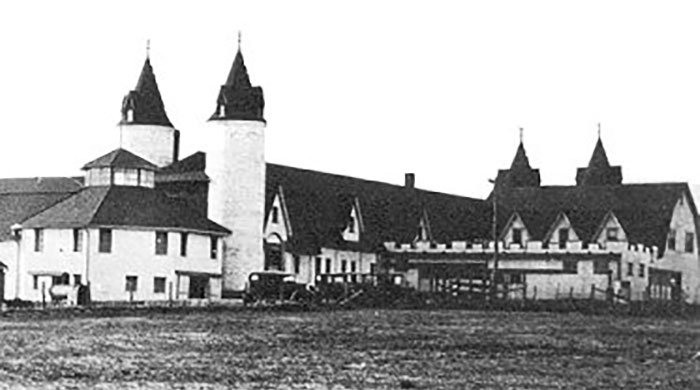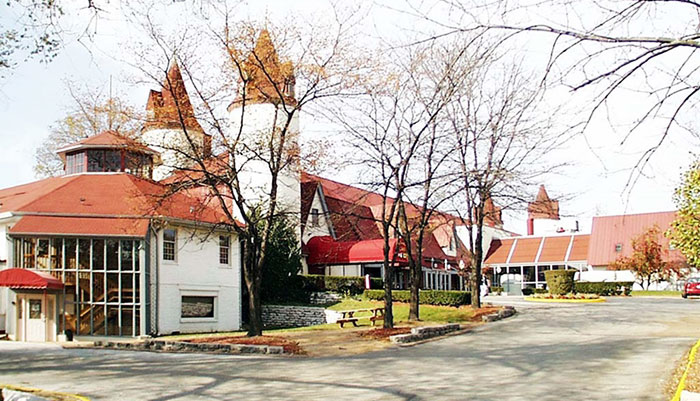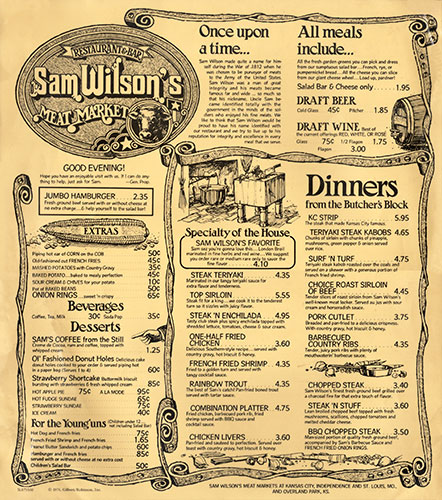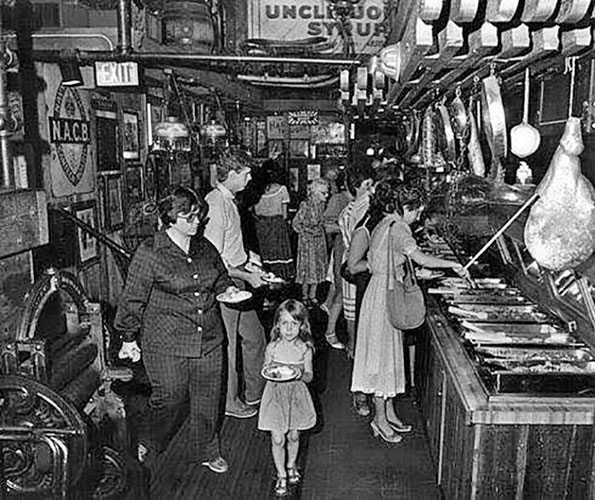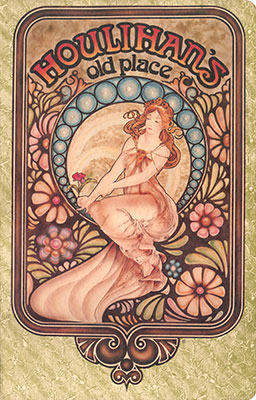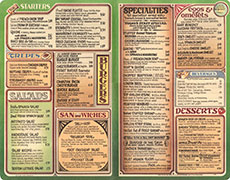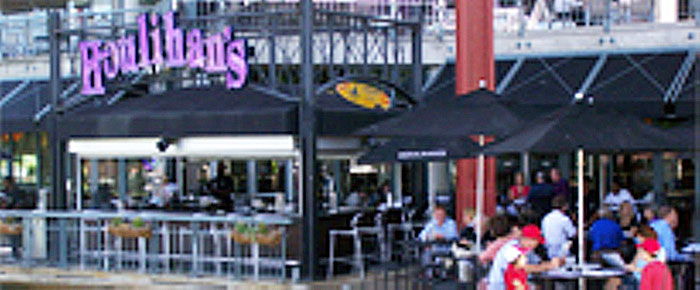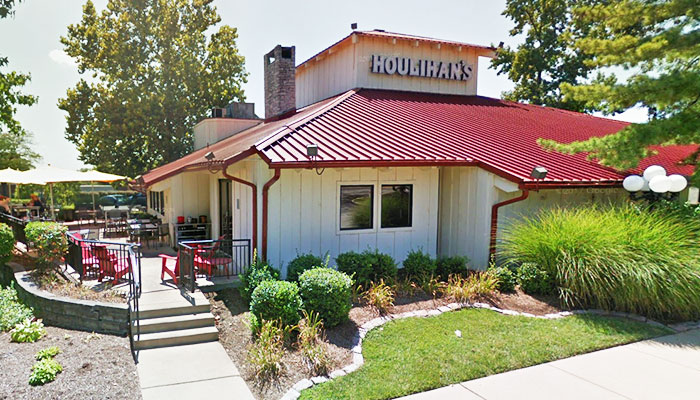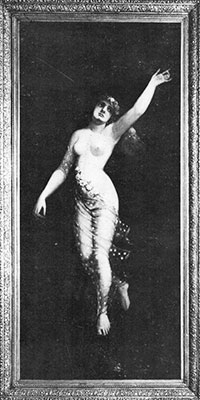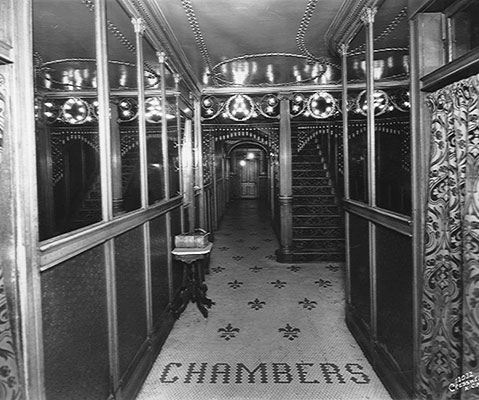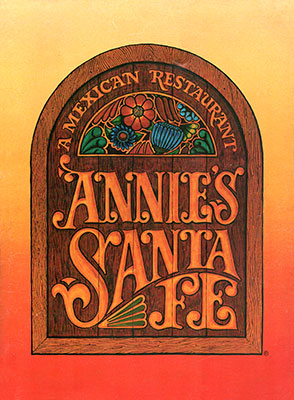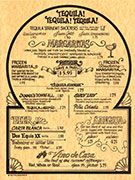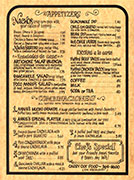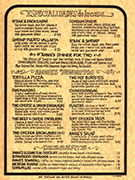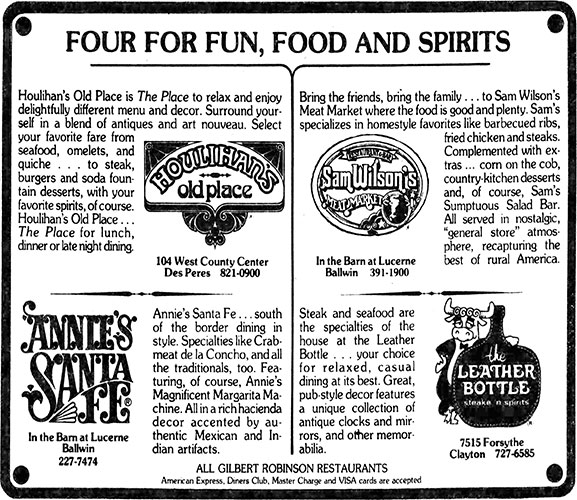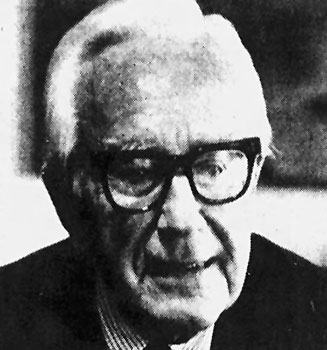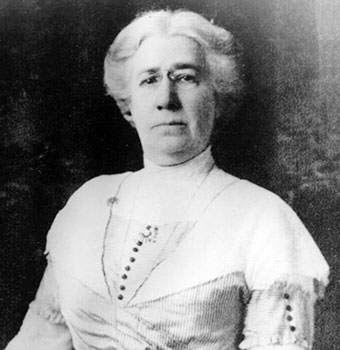|
Gilbert/Robinson Joseph W. Gilbert was born in Richmond, Indiana in 1899. By 1910, he was living with his family in Kansas City, Missouri. In 1921, he married Mildred Fowler.
Gilbert worked as dishwasher, fry cook and
assistant manager for a chain of Kansas City lunch counters owned by
his father-in-law, George C. Fowler. Of the six Fowler's Lunch
locations, only the one in the Westgate Hotel at 9th and Main
streets was unprofitable. Instead of selling the lagging restaurant,
Fowler gave it to Gilbert, who promptly turned it around by
improving the food and making friends in the ethnic neighborhood.
That was 1928 and Gilbert never looked back.
In 1940, Joe Gilbert won the restaurant contract at Kansas City's Municipal Air Terminal.
Gilbert partnered
with True Milleman, former manager of the Fred Harvey restaurant at
Kansas City's Union Station. Together, they created a Harvey-esque
enterprise for air travel, providing classy and affordable dining
along flight routes. Gilbert’s son, Joseph W. Gilbert Jr., joined the business in 1945. Soon, they began providing in-flight meals for airlines, becoming pioneers in the airline catering industry.
In 1951, Milleman sold his interest in the
business to Gilbert's son, and in 1953 the Milleman-Gilbert sign
came down and the first Joe Gilbert restaurant sign went into place.
For generations of Kansas Citians, Joe Gilbert’s Restaurant was a
place to go, whether to watch the planes take off or after a prom
for a late night snack.
In 1961, the Gilberts decided to venture into a
steakhouse and enlisted Paul Robinson, then manager of Kansas City's
Golden Ox, whom the Gilberts thought would know more about running a
steak restaurant. The new Gilbert/Robinson firm opened The Inn at
the Landing in 1962, specializing in steaks and seafood. The venture
was a success and spawned the prototype for a new
Gilbert/Robinson restaurant in St. Louis. The Leather Bottle In February of 1970, Gilbert/Robinson opened The Leather Bottle restaurant at 7515 Forsyth in Clayton. It was located in the southwest corner of the Famous-Barr parking garage, in a space that would eventually house Fio’s La Fourchette and Café de France. The restaurant's decor had a strong Spanish influence. The foyer floor was of Spanish quarry tile, the walls were stucco, a series of lounges and dining rooms were entered through arches, and the walls were adorned with antique mirrors and wrought-iron holders containing flickering candles. The beamed ceiling was painted a burnt-orange to match the carpeting. There were three dining areas, separated by dividers. Antiques collected from the pubs and inns of England and Scotland were scattered throughout the restaurant. Tiffany-style lamps lit the colorfully-set tables. Gilbert/Robinson's practice was to hire college students with pleasing personalities and train them to provide quality service. Beverage counselors in brightly- printed miniskirts took drink orders and food counselors in bell-bottoms and leather aprons presented the menu, took food orders and invited customers to build their own salads at the salad bar.
A menu specializing in
steaks, lobster and wines was painted on leather-covered wine
bottles. Side dishes included artichokes, baked potatoes and fried
mushrooms. There was ice cream pie for dessert.
A feature of The Leather Bottle was its
build-it-yourself salad bar, where diners scooped endive, iceberg
and romaine lettuce from a huge bowl and added such items as
scallions, olives, croutons and grated cheese. They then transformed
the rather ordinary makings into a truly delightful salad by topping
it with a special
anchovy-based dressing. Patrons were advised to
get in line early at the salad bar – the line never seemed to end.
In March of 1971, Gilbert/Robinson converted its Inn at the Landing in Kansas City to The Leather Bottle, based on the restaurant's success in St. Louis. They also opened Leather Bottle restaurants in Little Rock and Atlanta. But Gilbert/Robinson would eventually sell off their Leather Bottle chain, stating that the small kitchens limited menu options. The Clayton restaurant was purchased in 1978 by a local group headed by Richard and Ken Bland and Bob Norman, who opened a Chesterfield location on South Outer Forty Road in 1980. But the The Leather Bottle West closed in little over a year and the Leather Bottle in Clayton was corked and shuttered in early 1985. Sam Wilson's Meat Market The land at the southwest corner of Clayton and Kehrs Mill roads was originally owned by Henry Bopp. He built two brick barns on the property in 1906, reportedly using bricks salvaged from the 1904 World's Fair. Will Schisler acquired the property in 1915 and established the Calla Lily Dairy Farm, erecting a 50,000 square-foot dairy barn, office and silos.
The farm was purchased by John Ganahl in
1923. In 1941, St. Louis Dairy took over. The operation was
eventually absorbed by Sealtest before its use as a dairy farm came
to an end. It then sat idle except for a brief stint
as an antique auto museum.
In 1968, a fire caused extensive
damage to the vacant building. It was condemned by Ballwin city
officials in 1971. However, the historic structure was saved by
developer Paul Londe, who renovated it as a retail and entertainment
venue. The new complex was called the Barn at Lucerne and its first
tenant was Gilbert/Robinson's Sam Wilson's Meat Market.
Gilbert/Robinson opened the first Sam Wilson's Meat Market in Overland Park, Kansas in December of 1972. The Ballwin restaurant debuted at the Barn at Lucerne in the spring of 1975. The restaurant's octagon-shaped main dining room was at the barn's south end. Another dining area and the kitchen were to the west of the main dining room. One of the silos was used for private dining, with a spiral staircase, and the other for rest rooms. According to its menu, the restaurant was named for a famous meat supplier.
Sam Wilson's was styled after a late 19th
century general store. It was decorated with authentic
oxen yokes, a pot-bellied stove, a cream separator and numerous
antique farm tools. Curtained booths with patchwork quilt wall
panels and hanging kerosene-lamp fixtures added to the nostalgic
mood.
Sam Wilson’s did
indeed focus heavily on meat, with the KC Strip, teriyaki steak kabobs,
barbecued ribs, chopped steak and the jumbo hamburger all favorite
items. Fried chicken and fried shrimp also found their way onto the menu.
Extras included corn-on-the-cob and deep fried onion
rings. To top off the meal, Sam Wilson's had a
delicious selection of sundaes and desserts.
A popular feature at Sam Wilson's was the salad
bar. Customers were treated to a wide variety of fresh salad
ingredients, plus hot bread, butter and a giant slice-it-yourself
cheese wheel.
Gilbert/Robinson closed Sam Wilson's Meat Market at the Barn in the summer of 1984 and replaced it with a new pilot restaurant, Lucille's Country Dinner House. "We could see that to be successful, we would have to offer a different concept," said a Gilbert/Robinson manager. "Everybody around here served steaks and barbecue and had salad bars." Houlihan's Old Place Tom Houlihan owned and operated a popular menswear store in St Louis from 1953 to 1971, first downtown at 612 Olive Street and then at 7636 Forsyth in Clayton. Houlihan lived in Kansas City, where he also owned menswear stores, including one at 4743 Pennsylvania in Kansas City's Country Club Plaza. When he closed that location in 1971, Gilbert/Robinson took over the space and converted it to a restaurant.
Legend has it that during construction, the architect working on the
restaurant labeled his drawings "Houlihan's Old Place." The name
stuck. Houlihan's Old Place opened for
business on April 1, 1972.
Gilbert/Robinson opened another Houlihan's Old Pace in St. Louis in March of 1975. While Tom Houlihan's former menswear space on Forsyth might have been attractive, next door to the Shady Oak theater and down the street from the firm's successful Leather Bottle, the restaurant opened in a free standing building at the southeast corner of the West County Shopping Center at Manchester and Ballas. In his May 7, 1975 St. Louis Post-Dispatch review, Joe Pollack described the new restaurant's main dining room as "bright, with every inch of wall space crammed with signs, posters and a wide variety of visual gimmickry." The decor featured warm cinnamon colors, deep greens, polished wood and shiny brass.
Pollack described
Houlihan's menu as "on the gimmicky side, with many items that might
be considered pop or snack foods, like omelets and hamburgers with a
variety of toppings, some of which cover either."
In December of 1985, Gilbert/Robinson opened
Houlihan’s Restaurant & Bar at St. Louis Union Station. At the
time, Rich Gorczyca was Gilbert/Robinson's area director and Bill
Cardwell the corporate executive chef. The two would leave
Gilbert/Robinson and open their own restaurant in Clayton in 1987.
In November of 1986, a Houlihan's Old Place opened at the St. Louis Galleria on the main level near Dillard's. The restaurant had fewer artifacts and antiques than had been a tradition at Houlihan's. The color scheme moved from the traditional Houlihan's green to earth tones. A large bar overlooked tiered levels in the large dining room, which seated 292 people.
In 1994, a Houlihan's opened at 1085 North
Mason in Creve Coeur. By then, the "Old Place" moniker had been
dropped. While additional Houlihan's restaurants would open and
close at Crestwood Plaza, Chesterfield Mall and Fairview Heights,
the Creve Coeur location was the last to remain open in the St.
Louis market, abruptly closing at the end of 2019.
Annie's Santa Fe Annie Chambers was born Leanna Loveall on June 6, 1842 in Lexington, Kentucky. She rode in a parade when Abraham Lincoln was making his first bid for the presidency. She became a schoolmarm and married William Chambers. Their first child lived less than a year. During her second pregnancy she fell while taking a buggy ride and was in a coma for three days. During that time the baby was born dead and her husband was killed in a fall from a railroad trestle. Annie reacted to tragedy by resolving to "have a short life, but a fast and merry one." She moved to Indianapolis where she became a lady of the evening. In 1860, a heartbreaking affair with a married client resulted in her moving to Kansas City, where she opened her own bordello and became the most famous madam in the Midwest. Annie was the madam with a heart of gold. "I taught my girls manners and charm," she said. Girls were not allowed to smoke in the parlor for fear of "giving the place a bad name." An 11-foot, 8-inch painting of a naked woman hung beside the stairway in Annie Chambers' bordello. Reputedly the painting was of Annie herself. Annie's bordello was closed in 1923. The painting of the naked woman was discovered in 1963 by C. H. Bathurst who was an acquaintance of Joe Gilbert. Bathurst encouraged Gilbert to install the painting in one of his restaurants. While Gilbert was willing, he didn’t have a restaurant with an 11-foot-plus ceiling.
But Gilbert had an associate who hung the painting in his restaurant at
100 West Parkway in the
Country Club Plaza. When the restaurant closed, Gilbert took over
the space – and the painting of Annie Chambers. In March of 1974, he
reopened it as a Mexican restaurant named Annie's Santa
Fe.
In August of 1977, Gilbert/Robinson opened an Annie's Santa Fe in St. Louis at the Barn at Lucerne – minus the painting of Annie. The restaurant was designed in hacienda style featuring an authentic mixture of tiles and rich colored carpeting, wrought iron railings, large stucco-textured fireplaces, padded booths and hand-carved dining tables and chairs. Mexican and Indian artifacts, handcrafted ceramics, stained glass pieces and lush foliage added to the decor. The menu included a large selection of Mexican favorites such as tacos, enchiladas, burritos, tostados and guacamole salad. Annie's Santa Fe also offered specialties such as crabmeat de la concho, nachos supremo and tortilla pizza.
The beverage menu
featured Annie's Downfall and Shady Lady – an homage to
Annie Chambers.
Gilbert/Robinson
closed Annie's Santa Fe at the Barn at Lucerne in 1983. But another
Annie's opened in February of 1990 at 4054 North Cloverleaf Drive in
St. Peters. It served Mexican fare until 1996. Gilbert/Robinson opened other restaurants in the St. Louis market, including the Fedora Cafe & Bar at Union Station and the Bristol Bar & Grill in Creve Coeur. In 1978, Gilbert/Robinson was acquired by W. R. Grace & Co. – it changed hands multiple times after that. In 1994, the company's name was changed from the Gilbert/Robinson Restaurant Group to the Houlihan's Restaurant Group. Joseph W. Gilbert Sr. died in his sleep on September 29, 1983 while vacationing near Geneva, Switzerland. He was 84.
Annie Chambers died in her Kansas City mansion
on March 24, 1935. She was 92.
Copyright © 2020 LostTables.com |

